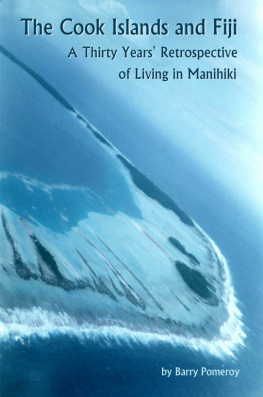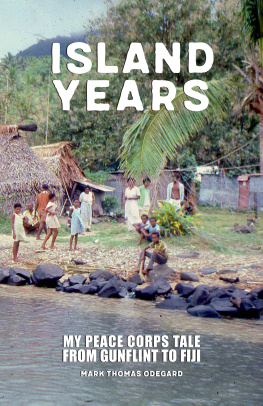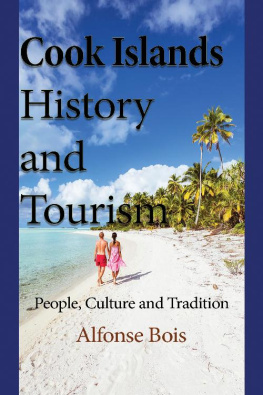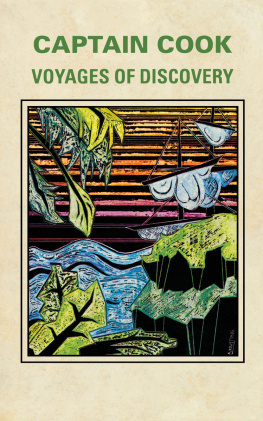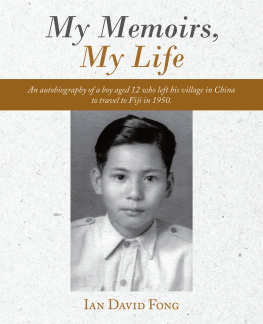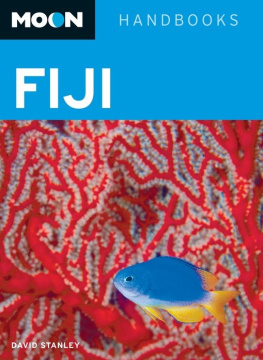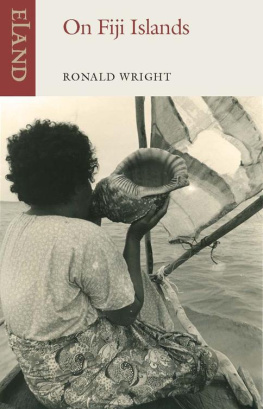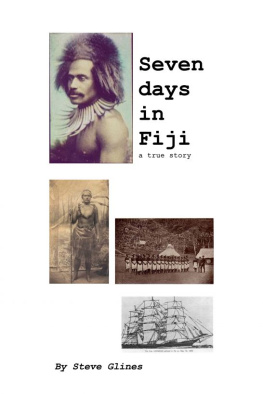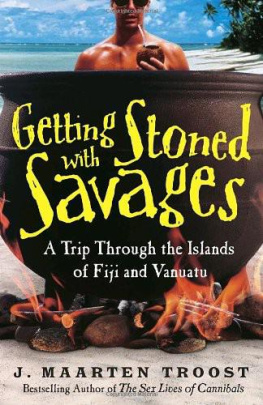The Cook Islands andFiji: A Thirty Years Retrospective of Living in Manihiki
by
BarryPomeroy
2019 by BarryPomeroy
All rightsreserved. Copyright under Berne Copyright Convention, UniversalCopyright Convention, and Pan-American Copyright Convention. Nopart of this book may be reproduced, stored in a retrieval system,or transmitted in any form, or by any means, electronic,mechanical, photocopying, recording or otherwise, without priorpermission of the author, although people generally do what theyplease.
For moreinformation about my books, go to barrypomeroy.com
ISBN 13:978-1987922769
ISBN 10: 198792276X
Thirty yearshave passed since I went to the Cook Islands and Fiji, and althoughthe original record of my voyage has long been lost, when I siftedthrough my memories of that most seminal time in my life, theentire trip was still there waiting for me. My first time overseas,teaching, and living with a family, I found that what Id beentaught about people from other countries was vague and largelyuntrue. Instead, the tapestry of the Islanders way of life wasmuch more complex, subtle, and even when I left I discoveredaspects of their culture that surprised me.
I lived in theCook Islands for four months, landing in Rarotonga where I found aplacement in the northern Cooks, and then teaching high school onManihiki. I travelled to the north by ship, by way of Aitutaki,Palmerston and Suwarrow, and visited the neighbouring island ofRakahanga while I lived in the northern Cooks. Traditional Maoriculture still peeked out from under its colonial blanketing, andeverywhere I went I was made to feel welcome. When my placement wasdone I flew to Fiji where I met other travellers, learned somethingof Fijian history and culture, and dreamed of floating a bambooraft down the Sigatoka River.
Table ofContents
Writing about the CookIslands and Fiji
When tropicalCyclone Martin devastated the tiny atoll of Manihiki in the earlyhours of November 1st, 1997, few in North America knew what washappening on the other side of the planet. Even as four survivorswere fighting for their lives by trying to sail to another islandwith a sleeping bag as a sail with their home island behind themdevastated, the North American media concentrated on concernscloser to home.
The cyclone hitthe country only a few years after I had lived there in 1991, andbecause in those pre-internet days international news did nottravel like it does now, I didnt know what had happened for nearlytwenty years. Only when the internet was fully functional, and Iwas thinking back on that most seminal time of my life, did I thinkto search for the people that I had known. Foremost on the list wasAna Katoa, the principal in the school in Tauhunu, Manihiki, whereI taught for a few months on a volunteer cross-cultural placementthrough Canadian Crossroads International.
The newsarticles I found were already old by that time, and thats when Irealized that the island I had so blithely imagined to havecontinued in the same vein as when Id last seen it, had profoundlychanged. The belated news that Cyclone Martin had devastatedManihiki and swept so many people to their deaths stirred upmemories of my time on the island that I thought were longburied.
After I foundthe news article about the cyclone, I was late into the nightscouring the internet looking for other old news pages so I couldlearn what had happened to the children I had taughtalthough nowthey would be adultsand the people I cared about most. I wastwenty-five at the time and likely impressionable, but the peopleof Manihiki had stayed with me all those years. I often wonderedhow my students were doing and where they were now. I learned thatnot a building was left standing except for the old coral and limechurch and that nineteen people had lost their lives. I found thestory about Ana and her husband Willie Katoas harrowing escapewhen they were washed out to sea. They had endured largely due toher, her husband, and a neighbours survival tactics. They wereswept into and then across the nine-kilometre lagoon and into theocean. During that time they lost their hold on their own children,and that was a terrible loss to read about. I spent hours trying tofind out if the children I knew and loved were still alive, but itwasnt an easy search.
The wreckagefrom the disaster had finally reached Canadian shores, and too lateI realized what those people had meant to me. As we get older andpeople pass in and out of our lives it is natural that we shouldforget some of them, but there are also others who have a deep holdon us. I wonder about close friends who disappeared in other ways,but I also cant help but remember that tiny isolated atoll and thepeople on it who so long ago opened their homes to a strangeforeigner who claimed to be a teacher, and taught me much abouttheir culture and way of living.
Even now, a fewyears after I initially heard about the disaster, I looked again. Iwondered how the people I knew over twenty years earlier endurednot just the cyclone and the aftermath and cleanup, but the changesthat and other events brought to their society. I guessed that myteacher friend, Api Dan, had likely died, since she was in hersixties then, but I looked for mention of her niece, my studentPeretira, whose brash sense of humour was a delight if a disruptionin the classroom.
Although at thetime I had planned to keep a journal by writing letters to mygirlfriend, I should have known that such a record in her unsteadyhands would not last much longer than my trip. By the time Iapproached her about photocopying what Id sent, the carefulmissives I wrote every day and posted once a week were gone. Sheinformed me that theyd gotten wet in her house and that shedpitched the lot. There was no record left, and I only had myunsteady memories of that time to guide me. Disheartened, I finallydismissed the notion of attempting to recover the story of my lifeon a tiny coral atoll in the middle of the South Pacific.
Only this yearI realized, while talking to some of my friends about my travels inthose times, that I remembered much more than I thought. With thatin mind, I turned once again to the attempt to record what Iremembered before it all disappeared from the world like theManihiki that now only exists in the memories of those who havelived at sea level in the South Pacific. Luckily, my retelling thestories over the years had kept some of the information alive in mymemory. I even recalled some dialogue, since I have the habit ofquoting when telling such stories to friends.
Ive written afew travel journals before, and some of them detail trips monthslong, such as How to get to Bangkok, my journal of mytravels to Thailand, Laos, Cambodia, Malaysia, Indonesia, andMyanmar in 2004-2005, and the record of my next trip to Thailand:Going Back to Bangkok, from 2011. I also wrote a record ofmy road trips by RV in South America: South America by RV:Chile, Peru, and Argentina from 2017, and Uruguay, Brazil,and Argentina, from 2018. I kept a log book (Life on theWater) of my trips with the wooden sailboat that Id built in2005 and 2007, and a five hundred kilometre trip by canoe down theSaint John River in New Brunswick, Canada in 2004. I spent a fewsummers building and then living in a cabin, and recorded thatventure in The Wish to Live Deliberately: Building a Cabin andits Consequences.
On each ofthose occasions I had kept a fairly careful diary so that I wouldnot lose track of those minor details which slip out ofrecollection once the traveller returns. As well, I was careful torecord my reactions to the world around me. The best time to makenote of the storys emotional content is while the impressions arefresh and before they become incorporated into the travellersnotion of the world or glossed over with a new version.
Although mymemories of living in the Cook Islands nearly thirty years ago arestill clear, my experiences there have become part of myunderstanding of the world, and because of that, my memories aresuspect. Such recollections by their nature are necessarilyincomplete and modified by our notion of ourselvesalthough theyare also, paradoxically, more accurateas the more recentperspective helps to put them into a useful context.
Next page
